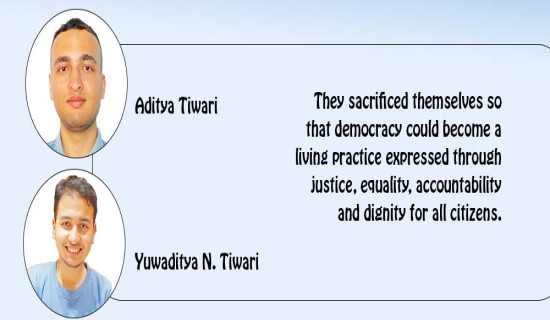- Friday, 30 January 2026
Framing Pharmacy Education In Nepal
Pharmacy education plays a crucial role in shaping the future of healthcare professionals. Over the years, the competency of Pharm D graduates has been a topic of discussion within the healthcare industry. In recent years, the Doctor of Pharmacy (Pharm D) programme has gained significant popularity worldwide due to its comprehensive curriculum and emphasis on clinical practice. Pharm D graduates undergo an extensive curriculum that covers a wide range of pharmaceutical sciences, clinical therapeutics, pathophysiology, pharmaceutical biotechnology, pharmacology, clinical toxicology, and pharmacy practice.
Pharm D education equips graduates with a strong foundation in drug and poison information, patient care, and medication management. The rigorous coursework ensures that graduates possess a deep understanding of drug interactions, dosage calculations, pharmacokinetics, and pharmacodynamics. Therefore, in terms of knowledge, Pharm D graduates are well-prepared to handle the complexities of the pharmaceutical sciences.
Clinical skills
One of the significant strengths of Pharm D graduates lies in their clinical skills. Throughout their education, they gain hands-on experience through internships, rotations, and practical training in various healthcare settings. These experiences allow them to develop crucial skills such as patient counseling, medication therapy management, drug monitoring, adverse drug reaction management, and managing toxicological emergencies. Pharm D graduates are trained to assess patients' medication needs, identify drug-related problems, advise on poisoning and drug overdose, and provide appropriate interventions. Their ability to apply clinical knowledge to real-world scenarios makes them competent healthcare professionals.
The field of pharmacy is constantly evolving due to advancements in drug therapies, technology, and healthcare policies. Pharm D graduates are equipped with the skills to adapt to these changes and continue their professional development. They are trained to critically evaluate new research, stay updated with emerging therapies, and apply evidence-based practices. However, graduates are encouraged to pursue continuing education, and certifications to enhance their knowledge and skills. Their commitment to lifelong learning ensures that they remain competent and up-to-date in an ever-changing healthcare environment. Overall, Pharm D graduates are well-prepared to meet the challenges of the pharmaceutical field and contribute significantly to patient care.
Kathmandu University, one of Nepal's leading educational institutions, has introduced the Pharm D program to address the evolving needs of the pharmaceutical industry and healthcare system in the country. The programme offers several notable strengths that contribute to its effectiveness in producing competent pharmacy professionals. Firstly, the curriculum is designed to provide students with a strong foundation in pharmaceutical sciences, clinical pharmacy, clinical toxicology, and patient care. The programme emphasises evidence-based practice, equipping students with the necessary skills to critically evaluate scientific literature and make informed decisions in patient care.
Furthermore, the program incorporates experiential learning opportunities, such as internships and clinical rotations, which allow students to apply their theoretical knowledge in real-world settings. This hands-on experience enhances their clinical skills, communication abilities, and problem-solving capabilities, preparing them for the challenges they may encounter in their professional careers.
Strength of the Pharm D programme is its focus on inter-professional collaboration. Students have the opportunity to work alongside other healthcare professionals, such as physicians and nurses, fostering a collaborative approach to patient care. This interdisciplinary exposure helps students develop a holistic understanding of healthcare and enhances their ability to work effectively in a team-based environment.
Despite its strengths, the Pharm D programme faces certain challenges that need to be addressed to ensure its long-term success. One significant challenge is the limited availability of experienced faculty members. The programme requires highly qualified and experienced educators who can effectively deliver the curriculum and guide students in their clinical training, particularly in chemotherapeutics, cardiology pharmacy, ambulatory care pharmacy, critical care pharmacy, poisoning and drug overdose, geriatric pharmacy, psychiatric pharmacy, and infectious disease pharmacy. Recruiting and retaining such faculty members can be a daunting task, considering the scarcity of qualified professionals in the field.
Additionally, the programme faces resource constraints, including the availability of advanced laboratory facilities and up-to-date learning resources in clinical settings. These limitations can hinder students' practical learning experiences and restrict their exposure to the latest advancements in pharmaceutical sciences. Addressing these resource constraints is crucial to maintaining the program's relevance and ensuring that students receive a comprehensive education.
Despite these challenges, the Pharm D programme presents significant opportunities for the advancement of pharmacy education in Nepal. The programme's emphasis on clinical pharmacy and patient care aligns with the evolving healthcare needs of the country. By producing highly skilled and competent pharmacy professionals, the programme can contribute to improving patient outcomes, promoting rational drug use, reducing antimicrobial resistance, and advancing clinical research in Nepal.
Future
The programme can play a pivotal role in promoting research and innovation in the field of clinical pharmacy, pharmacoepidemiology, pharmacogenomics, and outcome research. Furthermore, encouraging students to engage in research activities and providing them with opportunities to collaborate with renowned researchers and Nepal Health Research Council can foster a culture of scientific inquiry and contribute to the development of evidence-based clinical practice in Nepal.
The Pharm D programme is a significant step towards advancing pharmaceutical education in Nepal. With its comprehensive curriculum, emphasis on clinical practice, and interprofessional collaboration, the program equips students with the necessary skills to excel in their professional careers. However, addressing challenges such as faculty shortages and resource constraints is crucial to ensuring the program's long-term success. By overcoming these obstacles and capitalising on the opportunities it presents, the Pharm D programme has the potential to shape the future of clinical pharmacy education in Nepal, contributing to improved patient care, research advancements, and the overall development of the health care industry in the country.
(Dr. Lohani is the clinical director at the Nepal Drug and Poison Information Centre. lohanis@gmail.com)

















